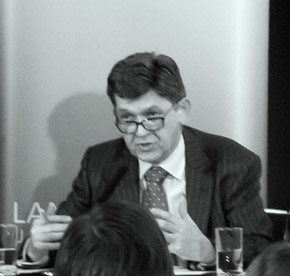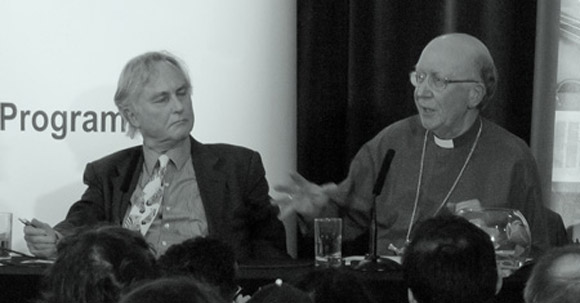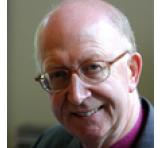What’s the Place of Faith in Schools?
- Academics
- Bob Jackson University of Warwick
- Jim Conroy University of Glasgow
- Public Figures
- Richard Dawkins Author, The God Delusion
- John Pritchard Bishop of Oxford, Chair of the Church of England’s Board of Education
Questions for debate
What place – if any – should faith have in our state school system, and in our schools – in both the formal curriculum (what is taught in the classroom) and informal curriculum (wider ethos of the school, including assemblies)?
Conclusions from the debate
There was a new settlement between religion and state school education in Britain in 1944. Since then changes have been implemented in a piecemeal way, attempting to keep pace with the rapid changes in religion and society. This has led to situation of crisis today which is evident in:
- Controversy over the existence of ‘faith schools’
- Inadequate teacher training to deal with faith
- Confusion about the requirement to hold acts of worship in all schools
- Patchy RE (Religious Education) teaching and degraded status of RE in the curriculum
There is an urgent need for joined-up thinking about the place of faith in schools and a new settlement as radical as that of 1944
Research Findings
Faith schools vary widely in nature – they cannot be categorised as a single group. Research shows many to be of high quality, with demand continuing to grow. Many are now taking Academy status. Faith schools’ admissions policies remain contentious.
The research uncovered serious problems with the way RE is taught in secondary schools. Although compulsory, RE is:
- under-resourced
- squeezed in the curriculum
- outside the Eng Bacc, and not always considered a serious subject
- subject to local variations in syllabus, and highly variable in quality
- no longer guided and resourced by Local Education Authorities, which are in crisis.
The research nevertheless finds examples of excellent practice in some schools, and student demand for RE has been growing strongly.
The statutory requirement to hold Acts of Worship ‘of a predominantly Christian character’ is widely ignored, and there is often fear of dealing with religion at all. There is widely varying practice across schools – from no collective gatherings, to banal notice-giving, to reflective spaces. Primary schools often deal better with Acts of Worship than secondary schools.

"What is happening to RE in our schools is a scandal for which we will have to pay a high price in years to come."
Points of Debate and Disagreement
| To educate any child in a faith is a form of indoctrination; children should be presented with religious and secular beliefs and be allowed to make up their own minds about the truth. |  |
Parents and society inevitably want children to be raised in the beliefs and values they believe to be true, and this does not curtail children’s liberty. |
| Faith schools should not be paid for from the public purse and state schools should be open to everyone. |  |
Given that faith is important for so many British people, it is appropriate that the state should support the sorts of schools people want – and a mixed educational system overall. |
| Acts of worship are anachronistic and should not be compulsory. |  |
Assemblies remain important, and schools should be guided and encouraged to use them in a way which caters for religious and non-religious as appropriate to the profile of the school. |
Practical Suggestions
There is widespread agreement that RE in Britain is in some disarray, despite the best efforts of many teachers and other educational professionals.
There is unwarranted nervousness at all levels about dealing with religion in schools.
The training of teachers in how to deal with faith is inadequate – not just for RE teachers, but all teachers.
The settlement reached in 1944 and added to piecemeal since then – in response to many developments including the changing nature of religion in Britain – is in urgent need of review. A new settlement is needed.
The situation is of concern for children and society as a whole. People who do not understand religion are simply not well educated. A religiously diverse society and world requires higher, not lower, standards of RE.

"There are many objections to faith schools. They are divisive, discriminatory, in some cases they actively teach scientific falsehoods (for example teaching literalistic Koranic creationism instead of scientific evolution). But for me, not the least objection to faith schools is that their very foundation and definition depends on the assumption that it is right to label a child with the faith of her parents."
"I wish politicians would go back more to breadth in education, related to the whole human person, and not just contemporary utility."
How the Media Reported the Debate
"State schools spend no more than £1 per pupil each year teaching religion, a Government-funded study found yesterday."
"These (religious schools) are schools which are funded by me and my partner as tax payers. However, they’re schools from which our children are excluded because I can’t profess to believe in a god that I don’t believe in."
"A Department for Education spokesman said: ‘RE remains a statutory part of the school curriculum for every student up to 16. It is rightly down to schools themselves to judge how it is taught, but the English Baccalaureate will not prevent any school from offering RE GCSEs.’"




